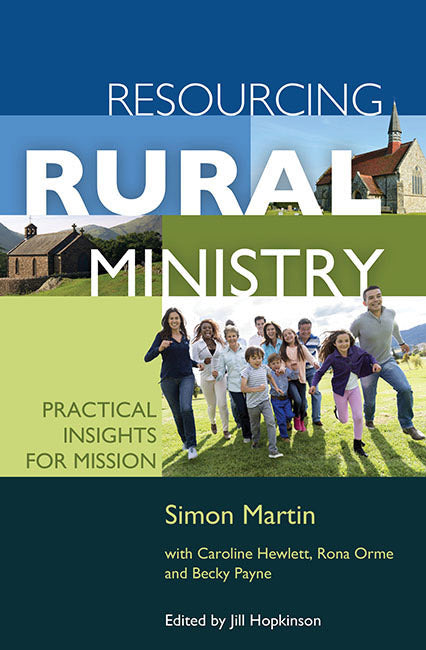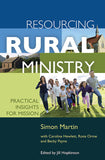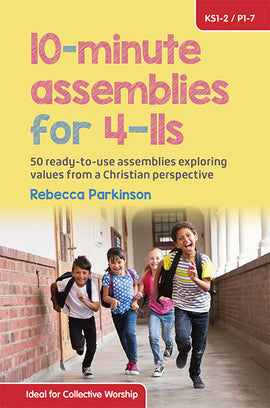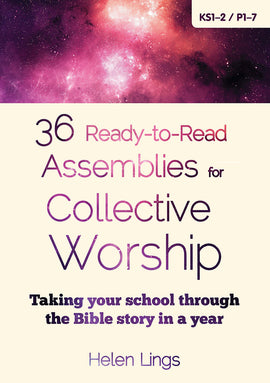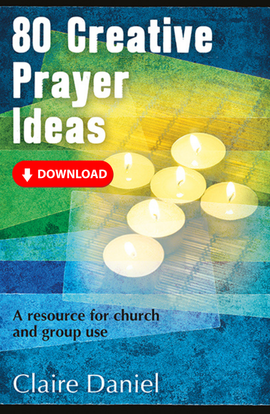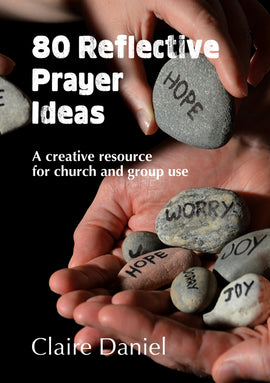Resourcing Rural Ministry: Practical insights for mission
Resourcing Rural Ministry offers an in-depth exploration of the key aspects, challenges and opportunities of mission in a rural church. Relevant for ordained and lay leaders alike, the book covers subjects ranging from encouraging evangelism in a multi-church group to making best use of church buildings.
| Title | Resourcing Rural Ministry: Practical insights for mission |
| Authors | Simon Martin with Caroline Hewlett, Rona Orme and Becky Payne; Edited by Jill Hopkinson |
| Description | Resourcing Rural Ministry offers an in-depth exploration of the key aspects, challenges and opportunities of mission in a rural church. Relevant for ordained and lay leaders alike, the book covers subjects ranging from encouraging evangelism in a multi-church group to making best use of church buildings. Containing a wealth of real-life case studies and suggestions for follow-up, this ecumenical publication draws on the expertise and resources of the Arthur Rank Centre (ARC), which has served the spiritual and practical needs of the rural Christian community for over 40 years. This book contributes to ARC's Germinate programme of training, development and support for rural multi-church groups of all denominations. Resourcing Rural Ministry was first developed by Simon Martin as Training and Resources Officer at the ARC. Additional chapters have been contributed by the Revd Caroline Hewlett, Rona Orme and Becky Payne and the final text has been prepared and edited by Jill Hopkinson |
| Details |
|
Resourcing Rural Ministry offers an in-depth exploration of the key aspects, challenges and opportunities of mission in a rural church. Relevant for ordained and lay leaders alike, the book covers subjects ranging from encouraging evangelism in a multi-church group to making best use of church buildings.
Containing a wealth of real-life case studies and suggestions for follow-up, this ecumenical publication draws on the expertise and resources of the Arthur Rank Centre (ARC), which has served the spiritual and practical needs of the rural Christian community for over 40 years. This book contributes to ARC's Germinate programme of training, development and support for rural multi-church groups of all denominations.
Resourcing Rural Ministry was first developed by Simon Martin as Training and Resources Officer at the ARC. Additional chapters have been contributed by the Revd Caroline Hewlett, Rona Orme and Becky Payne and the final text has been prepared and edited by Jill Hopkinson
This guide is rooted in the reality of rural life with all its opportunities and challenges. Experienced rural practitioners share stories and resources which will inspire and equip those Christians, lay and ordained, who are working together in the very varied rural communities in Britain. Simon Martin and the other contributors have provided an invaluable resource for all who are engaged in rural mission and ministry, which I hope will be widely read and used.
Revd Ruth Gee, BA, M Litt, President of the Methodist Conference 2013 - 2014, Chair of the Darlington Methodist District
If you want an inspiring read, this book is for you. This is a can-do book for whatever your context may be. I found it faith-building and full of fantastic stories, innovative ideas and best practice throughout its pages. This book is a must for anyone passionate about seeing the gospel transform their community, whether an individual, lay preacher or church leader, and will inspire creativity, energy and enthusiasm to make a real difference in your setting.
Roy Crowne, Executive Director, HOPE
Fundamentals of Christian faith and being church are story, relationships and being disciples. This book is packed with helpful resources and background theology that speak into all of these areas and will aid the rural church to be a vibrant and relevant presence in today's society. This is a 'must read' book for clergy, educators, lay leaders and anyone who has a heart for rural mission.
Revd Peter Ball, Mission and Training Officer, Eastern Synod of the United Reformed Church
A really useful, affirming, grounded, inspirational and practical resource book. Great for anyone in rural ministry, but with wisdom for those in lay and ordained ministry anywhere.
Lucy Moore, BRF Messy Church Team Leader
A key message of this very useful and usable collection is that we can learn so much from the stories of what God is doing among us and through us. Read these contributions and you'll be excited by a wealth of experience, insight and resource. How to develop a learning culture is a hugely important question, and it is a vital issue for the rural church in regard to worship, discipleship and evangelism. This book is a significant contribution to that development, not least because of its consistent theme of learning from each other and learning together. I warmly commend it to all who long for the flourishing of the rural church.
Rt Revd James Bell, Bishop of Ripon, Chair of the Rural Affairs Group of the Church of England General Synod
Resourcing Rural Ministry was first developed by Simon Martin as Training and Resources Officer at the Arthur Rank Centre. Additional chapters have been contributed by Revd Caroline Hewlett, Rona Orme and Becky Payne and the final text prepared and edited by Jill Hopkinson.
Pobl Dewi (Diocese of St David's) - June 2016
The Arthur Rank Centre has been the churches' focus on rural ministry and mission for 40+ years. The accumulated knowledge on all matters affecting every denomination is unrivalled. The connections into every diocese and district has distilled much experience into this small book. The title and subtitle show how the commitment of ministry is to mission. The key questions are asked and answered. What support is available for rural congregations that have limited resources and few members? How do you resource small, dispersed rural congregations and their leaders, lay and ordained?
The reliance on lay people is the norm in rural communities and churches. Clergy have to find their role, which can be very different from how it is in an urban church. The nature of church, its theology, worship, practical outreach and expectations are likely to be very different if there are less than a dozen regularly at worship.
Those few laypeople are likely to be involved in many other community activities and their witness does not go unseen. The community in which the church is set has its own rhythms and customs. It is wise to understand these so that the life of the church respects those that are honourable and desirable.
It is no surprise that this book refers readers to larger resources on the website (www.arthurrankcentre.org.uk). The chapter on worship recognises how it is part of the breath of the community, even for those who do not join in. There are many who may use the church building for their own good purposes, such as meditation and prayer, at other times of the week. The chapter on evangelism refers to the Journey to Faith section. There is a useful critique of Fresh Expressions and Messy Church. The chapter on children and young people brings together several good examples of rural churches that have tried new ways of building relationships with this generation.
Relationship is the key to rural ministry and mission. Many people have existing relationships and friendships and the church has to recognise these links so that its invitation to a new relationship with Christ is offered appropriately.
Church buildings have their own contribution to make in re-connecting church to community. Good examples abound.
Revd Canon Jeremy Martineau
Church Times 29 April 2016
MULTI-AUTHOR books have their difficulties, but this is a book that will be widely appreciated and much read in rural parishes. The book was conceived and largely written by Simon Martin of the Arthur Rank Centre (the Church's presence at the centre of the farming and countryside world). Unfortunately, Simon became seriously ill before the completion of this book, and it was prepared for publication by Jill Hopkinson and other authors.
In the wake of Faith in the City (1985), the attention of the churches turned to rural matters, not least because of the animal-health problems of the 1980s. Faith in the Countryside (1990) seemed for a time to be the high watermark of the Church's concern with the countryside and its rural parishes. But in recent years there has been a steady flow of books on rural matters, among which this book now takes its place.
Books on the rural Church tend to fall into two categories: first, those that are essentially local histories, but which generalise about the state of affairs in the countryside; second, those about how to minister in rural areas which are full of accounts of how to confront the steady decline in rural church life.
This book contains little historical analysis of the development of rural parishes, but is full of accounts of pioneering work and how this has been achieved. Those in need of help as they seek to deal with the complexities of church life in rural communities should turn to this book, which is full of examples of 'what to do' and 'how to do it', many of them drawn from the Arthur Rank Centre's publication Country Parish.
There are chapters on discipleship and nurture; mission in the rural context; rural fresh expressions; worship in small churches; and the use and adaptation of historic church buildings.
For generations, the central issue in rural parishes has been who 'owns' the church, 'not in the sense of legal tenure but in the sense of who makes the rules, determines the programme and the general direction and feel of that church'. There have been historic struggles between patrons, clergy, and churchwardens. But today many parishes have witnessed ownership struggles between the old resident community and recent arrivals who bring a different understanding of the nature of the church.
Such differences have to be reconciled, because, according to Martin, a successful rural church must be run by its congregation. While it used to be considered that the role of the laity was to help the clergy do what was essentially their job, Martin and his co-authors make it clear that the rural church will only thrive if it is run by the laity, and the role of the very few rural clergy is to encourage and equip the laity to do this job
.In one church, a member of the congregation wrote on the wall 'This is my church.' This book makes clear that unless the laity, in every sense, own and take responsibility for the local church, it will die. Many will recognise the truth of this statement in the contemporary countryside.
The Rt Revd Dr Anthony Russell is a former Bishop of Ely and President of the Royal Agricultural Society of England.
Churches Together in England - April 2016
This book is long overdue as it brings many of the resources for mission from the Arthur Rank Centre - which has resourced rural ministry and mission for 40 years - into one place. This is very welcome for clergy and lay people alike and from across the churches in England, especially as it is said that 1 in 6 of the population live in rural areas.
Written by national advisors and local practitioners alike, Resourcing Rural Ministry does exactly what it says, by providing a wide variety of ideas, resources, case studies and comment for anyone concerned with the rural context of mission.
Apart from all the helpful information, what I like best about this book is the layout. Under straight forward titles and in short sections it is easy to find what you might be looking for. Whether it be Messy Church, Multi-Church Ministry, or rural aspects of Ministerial Training, it also includes examples of more unusual ministry e.g. Forest Church and various aspects of theological reflection e.g. Robert Warren's diagram of Doing, Being and Living.
Resourcing Rural Ministry draws on various traditions including monastic and Fresh Expressions, as well as quoting examples from different denominations. It is a compendium or 'one stop shop' for those who want to address the challenges of the rural church - especially practically.
As a practical guide, some may say Resourcing Rural Ministry is light in terms of political and social critique, and that it could have drawn more on major works on ministry and mission before it. I would say its strength lies in covering the contemporary ground brilliantly and with just the right amount of information and reflection to encourage every reader in the task of developing understanding, discipleship and rural ministry to get on with the task better informed.
All insights are positive, and difficult topics are not ignored. This is well illustrated in a quote from page 42: 'Multi-church ministry brings with it a great many joys and opportunities, in working with different communities and congregations. It also has its own tensions and complications and can be stressful for lay and ordained alike. We know that it is possible for some churches in rural multi-church groups to grow and to do so consistently over several years. We also know that many rural congregations have reduced in size and others maintain regular numbers attending'. What follows this quote is a chapter exploring the issues, with a pragmatic approach, based on research.
In short, this is a book for everyone in rural ministry. Full of ideas and encouragement, notes and anecdotes, resources and analysis that has been 'rural-proofed' to be relevant and helpful. Drawing on resources from the Arthur Rank Centre e.g. Country Way (p39) and Journey to Faith (p110), it draws on 40 years' experience and provides the reader with a wonderful overview, guide and mission resource all in one place.
Jim Currin
CTE Evangelisation, Mission and Media
Staff member on the Churches Rural Group
The Door (The Diocese of Oxford) March 2016
There is currently a group, established by the Diocesan Board of Mission, whose function is to consider a range of strategic initiatives to enhance the rural church, and this book is a welcome introductory resource for all those who have an interest in rural ministry and its expression in the 21st century.
The authors recognise the specific characteristics of rural ministry relating to context, culture and community and the need to be aware of the specific ways these impact on church life. In keeping with Living Faith there are resources related to mission and ministry including chapters on worship, evangelism, discipleship, children and young people, and developing Messy Church. The book offers a range of ideas, initiatives and approaches in these and other areas, drawing on a range of denominations.
One of the most helpful sections is by Simon Martin who maintains that rural churches are particularly effective in showing Christ's compassion to those in need and also in what might be termed low level nurture and teaching. He is realistic about the appropriateness of using some resources in the rural context and offers helpful ideas and resources such as the sharing of stories and the use of the Arthur Rank Centre's Equipping for Rural Mission via www.germinate.net/go/profiling.
As he rightly states small rural churches are not failed larger ones. Rather they have a range of expressions, networks and routes into their communities that enables them to function as a little yeast, that, in the words of Saint Paul to the Galatians, 'leavens the whole batch of dough'.
Regarding discipleship and nurture, as in other chapters, a number of resources are offered alongside comments and observations from those who have used them. Again there is a helpful degree of realism here to enable one to assess whether what one might offer is appropriate not only for the local context and communities, but also for the resources one has available. This book could well be used by members of rural multi-parish benefices, and within rural deaneries, as a vehicle for gaining fresh insights for rural ministry. By focusing on each chapter in turn, resources for discussing mission and ministry could be creatively and imaginatively explored.
The Revd Charles Chadwick is the Parish Development Adviser in the Dorchester Archdeaconry and Leader of the Rural Strategies Steering Group.
Methodist Recorder 29 January 2016
This book is a small, but useful, contribution to counteract the old dictum, 'If all you have is a hammer, everything looks like a nail.' Encouraging all churches to believe in possibilities and experimentation, it is a book of 'realtime' stories from across the country, of folk just like you and I, not giving up. Men and women questioning and engaging their localities with bespoke attempts to reach out and reveal the something of the divine and the importance of spiritual reflection in all of our lives.
Given that, for the past 20 years or more, the polls and pundits are shouting that, in all our mainstream Churches, the active attendance in local churches of our neighbours is rapidly declining.
Counteract
The stories relayed within Resourcing Rural Ministry - Practical Insights for Mission by Simon Martin with Caroline Hewett, Rona Orme and Becky Payne simply try and counteract the data so often solemnly presented at synods and conferences, but it cannot contradict the overall important trends being revealed. The 'number crunchers-crunching' suggest that our neighbours simply see no need of 'belonging' or 'embracing' the stories of faith.
Simon Martin and editor Jill Hopkinson from the Arthur Rank Centre, with friends and colleagues, offer throughout this book (203 pages) cameos of hope and experimentation.
We, in the Church, have become familiar with terms like 'fresh expressions' and 'messy churches', but perhaps not with 'Eastertingle' or 'Who let the Dads out' groups, ie the men who care for their little ones gathering together. Even a 'Forest Church' that explores worship in a landscape/outside of a church building.
At the end of the book five pages point to other resources tried and tested - probably
some useful and successful, others not so, but all venturesome and calling us to
take courage!
Envisioned
Throughout this book it points to envisioned lay folk and clergy. One short paragraph struck me on p160 (Bar Nash-Williams united benefice of Stamfordham and Matfen): 'All the good plans and keen participation come to nothing if you don't start with the heart, it's your heart that says, 'It's worth it just for one child'. Its the heart that says, 'We do what we can and trust to God for the rest.' When you start with that attitude a tiny church can do good things with tiny resources.'
Amen to that. For we Methodists those words speak to our DNA of 'warmed hearts' and 'faithful service' to our God-given communities wherever you are. I commend this book to those who are seeking some ideas with a warm heart.
The Rev Canon Alan Robson is Lincolnshire agricultural chaplain.
From METconnexion. December 2015
If you are looking for a practical understanding of the main issues, challenges and responses in rural ministry in Britain, this is the text for you. It's very accessible, straightforward and written by Simon Martin and others who are all associated with the Arthur Rank Centre (ARC) which seeks to equip the rural church for effective ministry and mission.
What I particularly like about this book is that it covers the main areas, at least as I understand them. Too many books on rural Christianity spend a lot of their time offering an analysis of the changing nature of rural communities, dealing with indices of rural deprivation, mobility and so on. This is important and helps us to understand the rural context in which we live out our faith and minister. But, too often they don't offer enough direct suggestion as to what we might actually do.
The chapters consider mission, worship, evangelism, messy church, fresh expressions, worship, discipleship, young people and multi-church ministry. I particularly appreciate the separate chapters on mission and evangelism. Too often these areas are conflated and the result is that being involved with people outside of the believing community is considered to be evangelism. In reality that is mission which creates the opportunity for a more direct sharing of faith and a challenge to discipleship. This book very helpfully, in my view, gets this right.My one small criticism of this book is that it's a bit Anglican. That is fully understandable. The ARC (http://www.arthurrankcentre.org.uk/) is a largely Anglican organisation with a Methodist/United Reformed Rural Officer. The book refers to a lot of ARC resources and programmes which can be used for anyone, although at times there is more of an Anglican flavour. The chapter on 'multi-church ministry' is a good example where the Methodist norm is discussed but rather than strengths and weaknesses of a rural circuit being considered there is more of an introduction to how Methodists do things for others. I think more could be learnt by Methodists and others by a sharper critique of the current Methodist circuit.This is a very good book that enables us to better understand the challenges and possibilities in rural mission and ministry. It does point to the need to produce more material that helps Methodists and other non-Anglicans understand their nuanced context. This is a fine resource that will benefit many.Rev'd Dr Stephen Skuce
Country Way magazine - January 2016
We all know that society is changing rapidly and that there is a real need for Christians to find new and innovative ways of ensuring that the story of Jesus and the love of God, for this world, and us as individuals can still be heard and responded to.
What is not always so easy is finding the right models and ways for doing so. Resourcing Rural Ministry is therefore a 'must have' on the bookshelf of all those who wish to think about what God is saying to the rural church in this generation. In many ways rural church life comes with some unique opportunities as well as often being at the heart of the many challenges facing rural communities in the 21st century.
Whilst no book can offer all of the answers, and each context is unique, Resourcing Rural Ministry will help people to think about their rural context, the story the rural church has to tell and then to look at the mission opportunities this provides through practical ideas. The fundamentals of the Christian faith and being church are story, relationships and growing as disciples. This book is packed with helpful resources and background theology that speak into all of these areas and will aid the rural church to be a vibrant and relevant presence in today's society. God provides us with many opportunities to be more missional in our approach and outlook toward church and community life, and this book is a useful tool to help us grasp those opportunities.
Peter Ball

